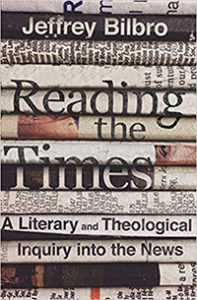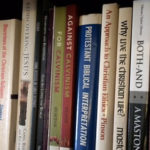Reading the Times: A Literary and Theological Inquiry into the News
By Jeffrey Bilbro (IVP Academic)
Jeffrey Bilbro attempts to explain in his forthcoming book Reading the Times how Christians can read the news Christianly.
 His central argument in Part One is that modern media distracts or overwhelms to the point of numbing one’s ability to think. Regular consumers of such media give themselves over to making much ado about nothing, and not enough ado about what really matters. They allow themselves to get worked up about trivia or events far away about which they can do nothing.
His central argument in Part One is that modern media distracts or overwhelms to the point of numbing one’s ability to think. Regular consumers of such media give themselves over to making much ado about nothing, and not enough ado about what really matters. They allow themselves to get worked up about trivia or events far away about which they can do nothing.
To combat modern media’s effect, Bilbro suggests: (1) a holy indifference to outcomes that, while not being uninvolved, entrusts the results to God; (2) quieting oneself enough to attend to one’s own role in the news. In so doing, a person can become a maker of news instead of a consumer and can attend to the important matters nearby.
Bilbro begins Part Two with a dive into the distinction between two views of time—the ancient cyclical view and the more modern linear view. The former is less concerned with history and therefore has little use for news. The linear view requires news to stay abreast of how history is progressing.
A third view of time is encapsulated in the Christian story of eternity breaking into chronological time. Bilbro points to the prophets and the incarnate Christ as examples of those who weave eternity to chronological time, giving the events of earthly time meaning through their connection to a “divine drama.” Christians can practice this weaving by following Karl Barth’s counsel to read with the newspaper in one hand and the Bible in the other, the Bible interpreting the news. Also, the church year and daily liturgies can frame earthly events.
Part Three is perhaps the most interesting for those in the news media with the ability to affect its change. Bilbro cites research disproving the conventional thinking that fact-checking and diversifying one’s news feed will lead to being better informed. He argues these are tweaks that don’t get to the root problem.
News media has a community-forming tendency—community being more pseudo than actual—Bilbro argues. He offers two possible means for overcoming pseudo-community: (1) go for a walk in the neighborhood on a regular basis, and (2) subscribe to and participate in small news organizations close to home or to one’s interests.
Reading the Times likely is too heady for the average reader and therefore misses the majority of those who could benefit from his conclusions. After the first two parts, Bilbro’s final suggestions might leave the reader retorting, “That’s it?” On one hand, they are not sufficient in themselves to undo the effects of tribalism, polarization and social isolation—or to repair the news. On the other hand, their simplicity reinforces his opening point.
Eric Black, executive director, publisher, editor
Baptist Standard














We seek to connect God’s story and God’s people around the world. To learn more about God’s story, click here.
Send comments and feedback to Eric Black, our editor. For comments to be published, please specify “letter to the editor.” Maximum length for publication is 300 words.